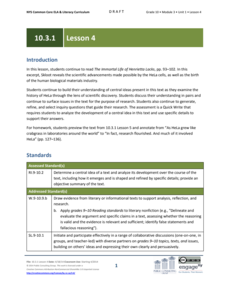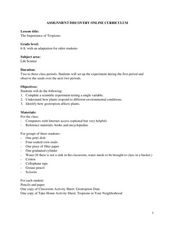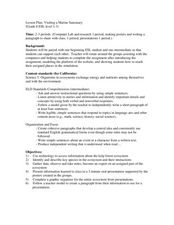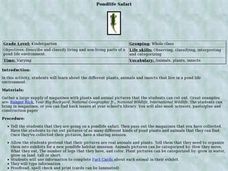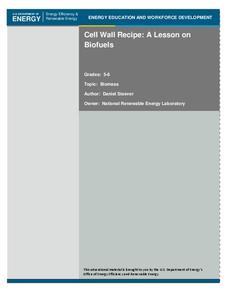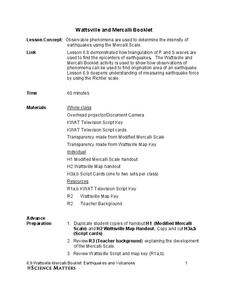Scholastic
Lesson Three: The Earth, Movement in Space
If you feel like you're standing still, you're wrong! The Earth is constantly rotating and orbiting under our feet. Demonstrate the Earth's movement within the solar system with a collaborative activity. With a candle or lamp in the...
EngageNY
Grade 10 ELA Module 3: Unit 1, Lesson 1
Can people live forever? Scholars ponder the answer as they analyze an excerpt from The Immortal Life of Henrietta Lacks. As readers discover Lacks' immortal cells, they discuss how the author carefully sequences, connects and unfolds...
EngageNY
Grade 10 ELA Module 3: Unit 1, Lesson 4
It's all about the details. Scholars examine how specific details contribute to a central idea in an excerpt from The Immortal Life of Henrietta Lacks. Learners discuss the details in pairs, share with the group, and respond to guided...
Curated OER
Urban Life: What Lives in Our Schoolyard?
Students research living organisms by exploring their school grounds. For this microscopic observation lesson, students gather materials, insects, and objects from their playground and schoolyard and bring them into class. Students...
Curated OER
Quality of Life Investigations: Risk Reductions
Students participate in a discussion of recent environmental issues affecting their own community or ones nearby. In groups, they research the role of food additives and the purpose of adding them to foods. They also determine their...
Curated OER
Life Skill Communication
Students use digital camera to document the needs for daily living. In this life skills and visual arts lesson, students create class books that include photographs of everyday objects that they use in their home, school and...
Curated OER
Sequence Writing: Life Cycles - Plant Life
Young scholars investigate the stages of plant life. Students create a K-W-L chart. They describe six main stages of the plant life cycles. Using stickers, young scholars create a life cycle flow map.
Curated OER
Marine Mammal Diving Reflex
Tenth graders discuss marine mammal diving reflex, and measure pulse rate while holding their breath under three conditions: control, warm water, and ice water to determine if humans exhibit marine mammal diving reflex.
Curated OER
Marine Life Research and Persuasive Conservation Pamphlet
Tenth graders examine conservation and research a type of fish that is under environmental stress. In this conservation lesson students create a pamphlet about the conservation of a marine organism.
Curated OER
'O'opu Life Cycle
Learners investigate the life cycle of the 'o'opu also known as Hawaiian gobies. In this amphidromous living lesson plan, students discuss the reproductive cycle, create props and an obstacle course to demonstrate the importance of...
Curated OER
Animated Video Productions - Life Cycles
Seventh graders compare/contrast the life cycles of free-living organisms to that of parasites. They conduct Internet research, illustrate the stages of a specific organisms's life cycle, and direct and produce a mini-video production.
Curated OER
The Importance of Tropisms
Students investigate plant tropisms using the scientific method. In this life science lesson, students learn about tropisms and test the response of corn seedlings to gravity. Response questions, extensions, and an adaptation for...
Curated OER
Marine Archaeology
Young scholars examine marine archaeology. In this archaeological data lesson, students see how archaeologists use data to make inferences about shipwrecks. Young scholars read data and make their own inferences, write about marine life...
Curated OER
Visiting a Marine Sanctuary
Students gather information on a kelp forest and identify species in that ecosystem. In this underwater ecosystem lesson students gather data, give an oral presentation and create a poster.
Curated OER
Types of Marine Debris
Students conduct an experiment. In this marine debris and environment protection lesson, students categorize trash into piles, predict whether these trash items will sink, float or be picked up and carried by the wind and then test...
Curated OER
A Frog's Life Story
Young scholars examine a frog's life cycle. In this amphibians lesson, students read a book about frogs and discuss how frogs are born and how they grow. Young scholars complete worksheets on the life cycle of the frog, and hold a...
Curated OER
Sequencing Life Cycles and Daily Activities
First graders sequence story situations. In this sequencing lesson, 1st graders read Charlie the Caterpillar and sequence his life cycle. Students role play the story parts and sing a song about metamorphosis.
Curated OER
Pond-life Safari
Students determine the living and non-living parts of pond life. In this pond life lesson, students examine the plants, animals, and insects that live in ponds. They look through a variety of print media, cut out pictures, and arrange...
PHET
Planet Designer: What’s Trending Hot?
Excite scholars to design their own planet in this first of five lessons. The lesson starts with a pre-activity assessment, a complete lesson plan that is easy to implement, and a post-activity assessment that would look great...
Captain Planet Foundation
George Washington Carver and the Sweet Potato
Learn about George Washington Carver's important contributions to agriculture by studying the sweet potato. First graders read about the inventor's observations and prepare sweet potato slips for the class garden. Additionally, they...
Curated OER
Cell Wall Recipe: A Lesson on Biofuels
Biotech engineers discover that changes in the DNA code for cell wall formation can help create crops better suited for biofuel production. They extract DNA from wheat germ. They decode paper strips with codes and relate the activity to...
SeaWorld
Animal Migrations
Here is a fabulous set of activities for your young scientists. Each lesson contains map, hands-on, and game activities that will help the class understand why and how animals migrate from one place to another. First they'll examine the...
Howard Hughes Medical Institute
The Making of the Fittest: Got Lactase? The Co-evolution of Genes and Culture
Got milk? Only two cultures have had it long enough to develop the tolerance of lactose as an adult. Learn how the responsible genes evolved along with the cultures that have been consuming milk. This rich film is supplied with a few...
Science Matters
Wattsville and Mercalli Booklet
There has been an earthquake! Can you listen to the description of damage given by callers in order to determine the epicenter? The 11th of 20 lessons has pupils read a script of one emergency caller. The class records the information on...


